In a sign of the sea change in New York City politics since the end of the Bloomberg era, this year’s discussion on City funding for CUNY was not about whether to cut – it was about how much to add.
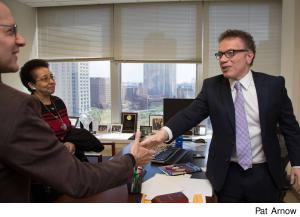 |
A handshake deal on the final budget was announced on June 19 by Mayor Bill de Blasio and City Council Speaker Melissa Mark-Viverito, and it included a significant boost in support for CUNY.
The spending plan includes an additional $19 million proposed by the mayor for science, technology, engineering and math (STEM) programs at CUNY community colleges, an expansion that will add about 60 full-time lines. Also included was a council initiative adding around $11 million to fund merit-based CUNY scholarships, similar to the former Vallone Scholarships that were axed by Bloomberg. An additional $1 million to support CUNY’s Citizenship NOW! hotline was also added.
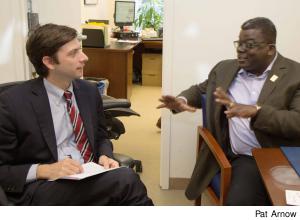 |
Powerful First Step
The increased funding “is a powerful first step in ending the era of disinvestment in CUNY,” said PSC President Barbara Bowen. “It marks the beginning of achieving the goal of dramatically increasing City support for CUNY.”
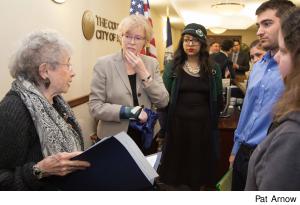 |
During budget negotiations, PSC First Vice President Steve London praised the council’s leadership and the mayor for working together to end “the pattern of cuts and partial restorations” that had characterized discussions of CUNY funding in the past.
During his campaign for mayor, de Blasio said that decades of funding cuts had “undermined CUNY’s historic role as a stepping stone to the middle class for more than a generation of working-class youth.” He put forward a big vision of boosting CUNY funding by $150 million, with the increase to be paid for by scaling back corporate tax breaks.
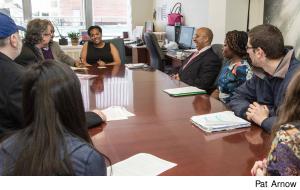 |
This year’s executive budget plan, de Blasio’s first as mayor, took a significant step toward that goal. The new money for STEM programs is slated to grow from $19 million in the coming year to $51 million in fiscal year 2017. Targets for the new spending include enrolling more STEM students in CUNY’s ASAP program, which helps community college students advance to their degree, and greater resources for academic advisement.
Earlier this spring, the PSC advanced a long-term proposal for how the $150 million increase could best be put to work (see Clarion, May 2014). In addition to investment in STEM programs, the union’s plan calls for 1,000 new full-time faculty lines, restoring City funding to at least the per-student level of 2008, and an ambitious need-based scholarship program.
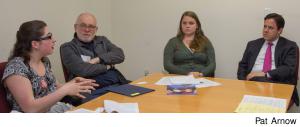 |
The new faculty hiring should emphasize recruitment from existing part-time faculty, who already know CUNY students well, and greater efforts to hire people of color, PSC leaders said. As a “down payment” on the 1,000 new positions, the union proposed 100 new hires in the coming fiscal year.
Bowen and PSC Secretary Arthurine DeSola testified before the council’s Higher Education Committee in support of funding for need-based financial aid. Existing aid programs let too many students and prospective students fall through the cracks, they said, especially undocumented students, part-time students, and those who are self-supporting without children
“Financial aid offices at CUNY could target this aid directly to where the most need exists, as they did under the now defunded ‘Safety Net’ financial aid program, initiated by the council a decade ago,” the PSC leaders testified.
Both these elements advocated by the PSC – the 100 new lines and money for need-based aid – were supported in a May 29 letter signed by Higher Education Committee Chair Inez Barron and 24 other council members. Welcoming the added funds in the mayor’s executive budget plan, the letter said that “more is needed in order to be able to provide for the quality of instruction that comes from lower student-faculty ratios.” The council members’ letter emphasized that expanding the presence of people of color on CUNY’s faculty must be an institutional goal.
‘More Is Needed’
The statement was released three weeks after the PSC’s annual “CUNY at the Council” grassroots lobby day; Borough of Manhattan Community College Chapter Chair Joyce Moorman was among 100 CUNY faculty, staff and students who took part in this year’s effort. “The reception we got was very positive, sympathetic and knowledgeable about the underfunding of CUNY by the City and the State,” Moorman told Clarion. Many council members and staffers are CUNY graduates themselves, she added, and they recognize the problems that PSC activists describe.
This year’s increases in CUNY funding marked an important change in direction, PSC activists say. Building on these gains next year will take a sustained effort – and it’s an effort they plan to make.

